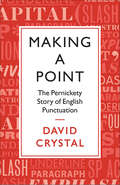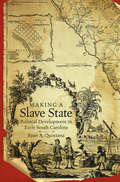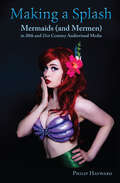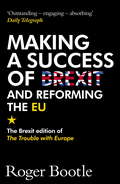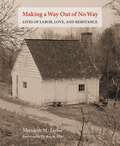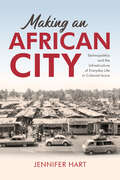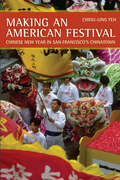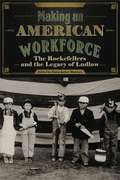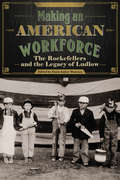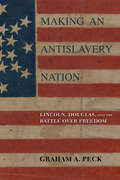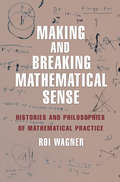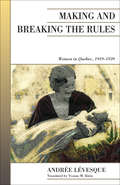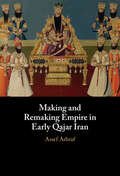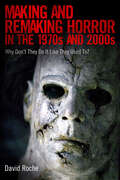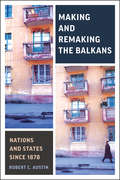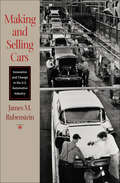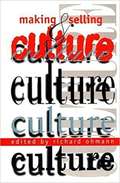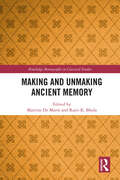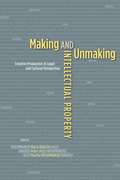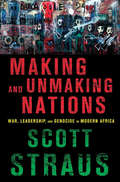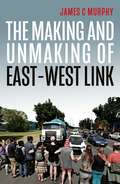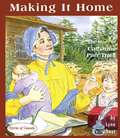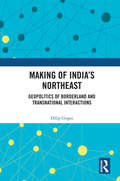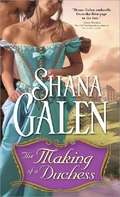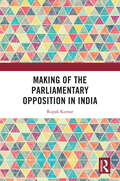- Table View
- List View
Making a Point: The Persnickety Story of English Punctuation
by David CrystalThe triumphant concluding volume in David Crystal's classic trilogy on the English language combines the first history of English punctuation with a complete guide on how to use it. Behind every punctuation mark lies a thousand stories. The punctuation of English, marked with occasional rationality, is founded on arbitrariness and littered with oddities. For a system of a few dozen marks it generates a disproportionate degree of uncertainty and passion, inspiring organizations like the Apostrophe Protection Society and sending enthusiasts, correction-pens in hand, in a crusade against error across the United States. Professor Crystal leads us through this minefield with characteristic wit, clarity, and commonsense. In David Crystal's Making a Point, he gives a fascinating account of the origin and progress of every kind of punctuation mark over one and a half millennia and offers sound advice on how punctuation may be used to meet the needs of every occasion and context.
Making a Slave State: Political Development in Early South Carolina
by Ryan A. QuintanaHow is the state produced? In what ways did enslaved African Americans shape modern governing practices? Ryan A. Quintana provocatively answers these questions by focusing on the everyday production of South Carolina's state space—its roads and canals, borders and boundaries, public buildings and military fortifications. Beginning in the early eighteenth century and moving through the post–War of 1812 internal improvements boom, Quintana highlights the surprising ways enslaved men and women sat at the center of South Carolina's earliest political development, materially producing the state's infrastructure and early governing practices, while also challenging and reshaping both through their day-to-day movements, from the mundane to the rebellious. Focusing on slaves' lives and labors, Quintana illuminates how black South Carolinians not only created the early state but also established their own extralegal economic sites, social and cultural havens, and independent communities along South Carolina's roads, rivers, and canals.Combining social history, the study of American politics, and critical geography, Quintana reframes our ideas of early American political development, illuminates the material production of space, and reveals the central role of slaves' daily movements (for their owners and themselves) to the development of the modern state.
Making a Splash: Mermaids (and Mermen) in 20th and 21st Century Audiovisual Media
by Philip HaywardThe representation of aquatic people in contemporary film and television—from their on-screen sexuality to the mockumentaries they’ve inspired.Mermaids have been a feature of western cinema since its inception and the number of films, television series, and videos representing them has expanded exponentially since the 1980s. Making a Splash analyses texts produced within a variety of audiovisual genres. Following an overview of mermaids in western culture that draws on a range of disciplines including media studies, psychoanalysis, and post-structuralism, individual chapters provide case studies of particular engagements with the folkloric figure. From Hans Christian Andersen’s “The Little Mermaid” to the creation of Ursula, Ariel’s tentacled antagonist in Disney’s 1989 film, to aspects of mermaid vocality, physicality, agency, and sexuality in films and even representations of mermen, this work provides a definitive overview of the significance of these ancient mythical figures in 110 years of western audio-visual media.
Making a Success of Brexit and Reforming the EU: The Brexit edition of The Trouble with Europe: 'Bootle is right on every count' - Guardian
by Roger Bootle"I recommend our diplomats and ministers read this book: it will provide them with an intellectual backbone. On the big calls [Bootle] has a spectacularly good record." Dominic Lawson, The Sunday Times "Bootle is right on every count." The Guardian HOW BREXIT WILL WORK FOR BRITAIN AND EUROPEMaking a Success of Brexit and Reforming the EU is the extensively revised and expanded new edition of the acclaimed The Trouble with Europe. Following Britain's vote to leave the EU and the ensuing uncertainty in both Europe and the UK, here, one of Britain's best known economists Roger Bootle, charts a way forward for all. For Leavers and Remainers alike, this book analyses the choices the UK faces about its relationship with the EU - and the rest of the world. It discusses the key issues concerning a 'hard' or 'soft' Brexit, Free Trade Agreements, the Single Market and the Customs Union, as well as the principles and pitfalls of the negotiating process. Meanwhile, with or without Brexit, the EU faces an existential crisis. It needs to choose between three different paths: radical reform, further integration or break-up. This book assesses the costs and benefits of each, concluding with a version of how the world would look without the EU. Bootle's exemplary outline of the origins and historical context of the EU is retained from the previous edition, where he acknowledges the remarkable achievements of the EU, before laying out the shortcomings which have led to the parting of the ways with Britain.This is the essential read as the Brexit negotiations progress.
Making a Way Out of No Way: Lives of Labor, Love, and Resistance
by Merideth M. TaylorA richly imagined, photo illustrated narrative of 150 years of life in slavery on tobacco plantations in Southern MarylandFor over 165 years, plantation owners in Southern Maryland depended on the labor of enslaved men, women, and children to bring in the tobacco crop. The photographs and stories in this book grew out of the author’s quest to understand how these people, who were subjected to a system that made every attempt to brutalize and dehumanize them, were able not only to survive but to build families and meaningful lives. Author Merideth Taylor has created a credible, well-researched, richly imagined world that is both informative and moving. The traditional central figure and linear plot of the novel has been replaced by an interwoven collage of scenes and community of characters, that reflect the diversity of experience, “silences,” and incompleteness of the historical record. Her choice to largely avoid graphic depictions of the violence perpetrated on enslaved bodies allows the reader to focus, instead, on the remarkable resilience, ingenuity, skills, and cultural strengths that enabled them to make a way out of no way. Author royalties will be donated to Historic Sotterley’s Descendant’s Project.
Making an African City: Technopolitics and the Infrastructure of Everyday Life in Colonial Accra
by Jennifer HartIn Making an African City, Jennifer Hart traces the way that British colonial officials, Accra Town Council members, and a diverse group of technocrats used regulation to define what an "acceptable" city looked like. Unlike cities elsewhere on the continent, Accra had a long history of urbanism that predated British colonial presence. By criminalizing some activities and privileging others, colonial officials sought to marginalize indigenous practices of Accra residents and shape the development of a new, "modern" city.Hart argues, however, that residents regularly pushed back, protesting regulations, refusing to participate in newly developed systems, reappropriating infrastructure, demanding rights to city services, and asserting their own informal vision for the future of the city. While urban plans and regulations ultimately failed to substantively remake the city, their effects were and are still felt by urban residents, who are often subject to but not served by urban infrastructure.Making an African City explores how the informalization of Accra's development was a historical process, not a natural and self-evident phenomenon, which connects the history of the city with the history of urban development and the growth of technocracy around the world.
Making an American Festival: Chinese New Year in San Francisco’s Chinatown
by Chiou-ling YehThis provocative history of the largest annual Chinese celebration in the United States—the Chinese New Year parade and beauty pageant in San Francisco—opens a new window onto the evolution of one Chinese American community over the second half of the twentieth century. In a vividly detailed account that incorporates many different voices and perspectives, Chiou-ling Yeh explores the origins of these public events and charts how, from their beginning in 1953, they developed as a result of Chinese business community ties with American culture, business, and politics. What emerges is a fascinating picture of how an ethnic community shaped and was shaped by transnational and national politics, economics, ethnic movements, feminism, and queer activism.
Making an American Workforce
by Fawn-Amber MontoyaTaking an interdisciplinary approach to the policies of the early years of the Colorado Fuel and Iron Company, Making an American Workforce explores John D. Rockefeller Jr.'s welfare capitalist programs and their effects on the company's diverse workforce.Focusing on the workers themselves--men, women, and children representative of a variety of immigrant and ethnic groups--contributors trace the emergence of the Employee Representation Plan, the work of the company's Sociology Department, and CF&I's interactions with the YMCA in the early twentieth century. They examine CF&I's early commitment to Americanize its immigrant employees and shape worker behavior, the development of policies that constructed the workforce it envisioned while simultaneously laying the groundwork for the strike that eventually led to the Ludlow Massacre, and the impact of the massacre on the employees, the company, and beyond.Making an American Workforce provides greater insight into the repercussions of the Industrial Representation Plan and the Ludlow Massacre, revealing the long-term consequences of Colorado Fuel and Iron Company policies on the American worker, the state of Colorado, and the creation of corporate culture. Making an American Workforce will be of interest to Western, labor, and business historians.
Making an American Workforce: The Rockefellers and the Legacy of Ludlow
by Fawn-Amber MontoyaTaking an interdisciplinary approach to the policies of the early years of the Colorado Fuel and Iron Company, Making an American Workforce explores John D. Rockefeller Jr.'s welfare capitalist programs and their effects on the company's diverse workforce. Focusing on the workers themselves—men, women, and children representative of a variety of immigrant and ethnic groups—contributors trace the emergence of the Employee Representation Plan, the work of the company's Sociology Department, and CF&I's interactions with the YMCA in the early twentieth century. They examine CF&I's early commitment to Americanize its immigrant employees and shape worker behavior, the development of policies that constructed the workforce it envisioned while simultaneously laying the groundwork for the strike that eventually led to the Ludlow Massacre, and the impact of the massacre on the employees, the company, and beyond. Making an American Workforce provides greater insight into the repercussions of the Industrial Representation Plan and the Ludlow Massacre, revealing the long-term consequences of Colorado Fuel and Iron Company policies on the American worker, the state of Colorado, and the creation of corporate culture. Making an American Workforce will be of interest to Western, labor, and business historians.
Making an Antislavery Nation: Lincoln, Douglas, and the Battle over Freedom
by Graham A. PeckThis sweeping narrative presents an original and compelling explanation for the triumph of the antislavery movement in the United States prior to the Civil War. Abraham Lincoln's election as the first antislavery president was hardly preordained. From the country's inception, Americans had struggled to define slavery's relationship to freedom. Most Northerners supported abolition in the North but condoned slavery in the South, while most Southerners denounced abolition and asserted slavery's compatibility with whites' freedom. On this massive political fault line hinged the fate of the nation. Graham A. Peck meticulously traces the conflict over slavery in Illinois from the Northwest Ordinance in 1787 to Lincoln's defeat of his arch-rival Stephen A. Douglas in the 1860 election. Douglas's attempt in 1854 to persuade Northerners that slavery and freedom had equal national standing stirred a political earthquake that brought Lincoln to the White House. Yet Lincoln's framing of the antislavery movement as a conservative return to the country's founding principles masked what was in fact a radical and unprecedented antislavery nationalism. It justified slavery's destruction but triggered Civil War. Presenting pathbreaking interpretations of Lincoln, Douglas, and the Civil War's origins, Making an Antislavery Nation shows how battles over slavery paved the way for freedom's triumph in America.
Making and Breaking Mathematical Sense: Histories and Philosophies of Mathematical Practice
by Roi WagnerIn line with the emerging field of philosophy of mathematical practice, this book pushes the philosophy of mathematics away from questions about the reality and truth of mathematical entities and statements and toward a focus on what mathematicians actually do—and how that evolves and changes over time. How do new mathematical entities come to be? What internal, natural, cognitive, and social constraints shape mathematical cultures? How do mathematical signs form and reform their meanings? How can we model the cognitive processes at play in mathematical evolution? And how does mathematics tie together ideas, reality, and applications?Roi Wagner uniquely combines philosophical, historical, and cognitive studies to paint a fully rounded image of mathematics not as an absolute ideal but as a human endeavor that takes shape in specific social and institutional contexts. The book builds on ancient, medieval, and modern case studies to confront philosophical reconstructions and cutting-edge cognitive theories. It focuses on the contingent semiotic and interpretive dimensions of mathematical practice, rather than on mathematics’ claim to universal or fundamental truths, in order to explore not only what mathematics is, but also what it could be. Along the way, Wagner challenges conventional views that mathematical signs represent fixed, ideal entities; that mathematical cognition is a rigid transfer of inferences between formal domains; and that mathematics’ exceptional consensus is due to the subject’s underlying reality.The result is a revisionist account of mathematical philosophy that will interest mathematicians, philosophers, and historians of science alike.
Making and Breaking the Rules
by Yvonne M. Klein Andree LevesqueDuring the interwar period, Quebec was a strongly patriarchal society, where men in the Church, politics, and medicine, maintained a traditional norm of social and sexual standards that women were expected to abide by. Some women in the media and religious communities were complicit with this vision, upholding the "ideal" as the norm and tending to those "deviants" who failed to meet society's expectations. By examining the underside of a staid and repressive society, Andrée Lévesque reveals an alternate and more accurate history of women and sexual politics in early twentieth-century Quebec. Women, mainly of the working class, left traces in the historical record of their transgressions from the norm, including the rejection of motherhood (e.g., abortion, abandonment, infanticide), pregnancy and birth outside of marriage, and prostitution. Professor Lévesque concludes, "They were deviant, but only in relation to a norm upheld to stave off a modernism that threatened to swallow up a Quebec based on long-established social and sexual roles."
Making and Remaking Empire in Early Qajar Iran
by Assef AshrafIn 1722, the Safavid empire collapsed. An empire that ruled for over two centuries, in its heyday it spanned parts of Central Asia, the Caucasus, and present-day Iran. The decades following its fall were ones of unrest and discord, and it was only with the rise of the Qajars in the 1780s that a level of stability was restored. Assef Ashraf devotes this book to an analysis of the making of the Qajar empire. It adopts a socially-oriented approach to political history - an approach that examines the discourse and political practices, and the centers and peripheries, of empire. Each chapter focuses on a particular practice that was at the heart of Qajar governance - land administration, gift giving, marriage, political correspondence, provincial diplomacy, and territorial conquest and tribal relations. By situating the formation of Qajar Iran in its early nineteenth-century context, Ashraf highlights the overarching themes of transition and change.
Making and Remaking Horror in the 1970s and 2000s: Why Don't They Do It Like They Used To?
by David RocheIn Making and Remaking Horror in the 1970s and 2000s author David Roche takes up the assumption shared by many fans and scholars that original horror movies are more “disturbing,” and thus better than the remakes. He assesses the qualities of movies, old and recast, according to criteria that include subtext, originality, and cohesion. With a methodology that combines a formalist and cultural studies approach, Roche sifts aspects of the American horror movie that have been widely addressed (class, the patriarchal family, gender, and the opposition between terror and horror) and those that have been somewhat neglected (race, the Gothic, style, and verisimilitude). Containing seventy-eight black-and-white illustrations, the book is grounded in a close comparative analysis of the politics and aesthetics of four of the most significant independent American horror movies of the 1970s—The Texas Chain Saw Massacre, The Hills Have Eyes, Dawn of the Dead, and Halloween—and their twenty-first-century remakes. To what extent can the politics of these films be described as “disturbing” insomuch as they promote subversive subtexts that undermine essentialist perspectives? Do the politics of the film lie on the surface or are they wedded to the film's aesthetics? Early in the book, Roche explores historical contexts, aspects of identity (race, ethnicity, and class), and the structuring role played by the motif of the American nuclear family. He then asks to what extent these films disrupt genre expectations and attempt to provoke emotions of dread, terror, and horror through their representations of the monstrous and the formal strategies employed? In this inquiry, he examines definitions of the genre and its metafictional nature. Roche ends with a meditation on the extent to which the technical limitations of the horror films of the 1970s actually contribute to this “disturbing” quality. Moving far beyond the genre itself, Making and Remaking Horror studies the redux as a form of adaptation and enables a more complete discussion of the evolution of horror in contemporary American cinema.
Making and Remaking the Balkans: Nations and States Since 1878 (Munk Series on Global Affairs)
by Robert Clegg AustinWith more than 25 years since the collapse of communism, the end of the wars and billions of dollars in aid, the Balkans are still characterized by corruption, state capture, and decidedly unmodern states that are often either weak or authoritarian. Taking the contemporary Balkans as a starting point, Making and Remaking the Balkans studies the region’s history combined with observations based on more than twenty years of field experience. Primarily concerned with current issues in the Balkans since 1989, this book explains why the region has endured such a prolonged and fraught transition to democracy and eventual membership in the European Union. The young and educated have largely left. Governmental crisis and economic stagnation is the norm and much-needed regional cooperation has been suppressed by renewed nationalism. Wars on corruption have proved to be largely rhetorical. Making and Remaking the Balkans offers a systematic study of the issues the entire region faces as it struggles to complete the European integration process at a time when the European Union faces bigger problems elsewhere.
Making and Selling Cars: Innovation and Change in the U.S. Automotive Industry
by James M. RubensteinFrom the creation of fast food, to the design of cities, to the character of our landscape, the automobile has shaped nearly every aspect of modern American life. In fact, the U.S. motor vehicle industry is the largest manufacturing industry in the world.James Rubenstein documents the story of the automotive industry... which despite its power, is an industry constantly struggling to redefine itself and assure its success. Making and Selling Cars: Innovation and Change in the U.S. Automotive Industry shows how this industry made adjustments and fostered innovations in both production and marketing in order to remain a viable force throughout the twentieth-century.Rubenstein builds his study of the American auto industry with care, taking the reader through this quintessentially modern history of production and consumption. Avoiding jargon while never over simplifying, Rubenstein gives a detailed and straightforward account of both the production and merchandising of cars. We learn how the industry began and about its methods for building cars and the modern American marketplace. Along the way there were many missteps and challenges—the Edsel, the fuel crisis, and the ascendancy of Japanese cars in the 1980s. The industry met these types of problems with new techniques and approaches. To demonstrate this, Rubenstein gives the reader examples of how the auto industry used to work, which he alternates with chapters showing how the industry has reinvented itself. Making and Selling Cars explains why the U.S. automotive industry has been and remains a vigorous shaper of the American economy.
Making and Selling Culture
by Richard M. OhmannAn in depth look at how culture and marketing play off each other.
Making and Unmaking Ancient Memory (Routledge Monographs in Classical Studies)
by Martine De Marre Rajiv K. BholaMaking and Unmaking Ancient Memory explores the way in which ancient Greeks and Romans represented their past, and in turn how modern literature and scholarship has approached the reception and transmission of some aspects of ancient culture. The contributions, organised into three sections – Political Legacies, Religious Identities, and Literary Traditions – explore case studies in memory and reception of the past. Through studying the techniques and strategies of ancient historiography, biography, hagiography, and art, as well as their effectiveness, this volume demonstrates how humanity has inevitably conveyed memory and history with (sub)conscious biases and preconceived ideas. In the current age of alternative facts, fake news, and post-truth discourses, these chapters highlight that such phenomena are by no means a recent development. This book offers valuable scholarly perspectives to academics and scholars interested in memory, historiography, and representations of the past in the ancient world, as well as those working on literary traditions and reception studies more broadly.
Making and Unmaking Intellectual Property: Creative Production in Legal and Cultural Perspective
by Mario Biagioli Martha Woodmansee Peter JasziRules regulating access to knowledge are no longer the exclusive province of lawyers and policymakers and instead command the attention of anthropologists, economists, literary theorists, political scientists, artists, historians, and cultural critics. This burgeoning interdisciplinary interest in "intellectual property" has also expanded beyond the conventional categories of patent, copyright, and trademark to encompass a diverse array of topics ranging from traditional knowledge to international trade. Though recognition of the central role played by "knowledge economies" has increased, there is a special urgency associated with present-day inquiries into where rights to information come from, how they are justified, and the ways in which they are deployed. Making and Unmaking Intellectual Property, edited by Mario Biagioli, Peter Jaszi, and Martha Woodmansee, presents a range of diverse--and even conflicting--contemporary perspectives on intellectual property rights and the contested sources of authority associated with them. Examining fundamental concepts and challenging conventional narratives--including those centered around authorship, invention, and the public domain--this book provides a rich introduction to an important intersection of law, culture, and material production.
Making and Unmaking Nations: The Origins and Dynamics of Genocide in Contemporary Africa
by Scott StrausIn Making and Unmaking Nations, Scott Straus seeks to explain why and how genocide takes place--and, perhaps more important, how it has been avoided in places where it may have seemed likely or even inevitable. To solve that puzzle, he examines postcolonial Africa, analyzing countries in which genocide occurred and where it could have but did not. Why have there not been other Rwandas? Straus finds that deep-rooted ideologies--how leaders make their nations--shape strategies of violence and are central to what leads to or away from genocide. Other critical factors include the dynamics of war, the role of restraint, and the interaction between national and local actors in the staging of campaigns of large-scale violence. Grounded in Straus's extensive fieldwork in contemporary Africa, the study of major twentieth-century cases of genocide, and the literature on genocide and political violence, Making and Unmaking Nations centers on cogent analyses of three nongenocide cases (Côte d'Ivoire, Mali, and Senegal) and two in which genocide took place (Rwanda and Sudan). Straus's empirical analysis is based in part on an original database of presidential speeches from 1960 to 2005. The book also includes a broad-gauge analysis of all major cases of large-scale violence in Africa since decolonization. Straus's insights into the causes of genocide will inform the study of political violence as well as giving policymakers and nongovernmental organizations valuable tools for the future.
Making and Unmaking of East-West Link
by James C MurphyMelbourne's aborted East-West Link - the massive, multi-billion-dollar inner-city toll road project that promised to knit Melbourne closer together-was divisive from the start. Intense picketing and protests, multiple court challenges, breathless media coverage and bitter politicking consumed the Victorian parliament for years. The link brought the downfall of the single-term Baillieu-Napthine Liberal government; its cancellation cost the state half a billion dollars, and it lives on in infamy - a byword for brinkmanship, waste and politicisation of infrastructure. But where did this notorious megaproject come from, and what explains its fate? Was it a project hand-picked by state premiers who miscalculated its electoral value? Was it foisted on the government by cunning roads bureaucrats, unprepared for the public backlash? Or was it simply that opponents of the project succeeded by turning it into an election issue? James C Murphy explores the saga from competing vantage points, detailing the layers of politics that saturate infrastructure policymaking in Australia.
Making it Home: The Story of Catharine Parr Traill
by Lynn WesterhoutAs a pioneer in Canada in the early 1800s, Catharine Parr Traill was one of the first writers to record the Ontario wilderness in literary and scientific detail, and her stories for young people became part of a new focus on young people. Her books on emigration encouraged other pioneers who struggled with life in a new country. Catharine was a natural storyteller who loved to write. As an adult in Canada, she wrote while she was hungry and fearful for her family’s safety. Her life was one of hardship and adventure, but also of great joy. This biography shows how an English girl called Katie became an adult who gave so much to North America’s early literature.
Making of India's Northeast: Geopolitics of Borderland and Transnational Interactions
by Dilip GogoiThis book examines India’s Northeast borderland – strategically positioned at the confluence of South Asia, East and Southeast Asia – from the perspective of international relations. The volume interrogates the geopolitics of region-making in both colonial and postcolonial times and traces the transformation of Northeast India from a British strategic frontier into a securitised borderland. It situates the region in transnational interactions both in conflict and cooperation with its immediate neighbouring regions of China, Bangladesh, and Myanmar, especially in the context of India’s Look East/Act East policy. The volume paves the way for a new ‘region-state’ framework borne out of the constructivist worldview and offers answers to many conundrums centring border studies. It further delineates approaches to overcoming the present geopolitical and territorial challenges of India’s Northeast with a critical thrust on regional policymaking. The volume will be of interest to students and researchers in the disciplines of social sciences and humanities in India as well as South and Southeast Asia. It will be especially useful to those in politics and international relations, strategic studies, international political economy, foreign policy, development studies and regional development, besides foreign policy-makers and diplomats, development practitioners, economists and policy analysts.
Making of a Duchess
by Shana GalenA very dangerous attraction... Julien Harcourt, duc de Valère, is more than willing to marry the lovely young lady his mother has chosen. Little does he know, she's been sent to prove him a spy and a traitor... And an even more dangerous secret... Sarah Smith's mission is to find out whether the Duc's trips to the Continent are as innocent as he claims, but the way he looks at her is far from innocent... Their risky game of cat and mouse propels them from the ballrooms of London to the prisons of Paris, and into a fragile love that may not survive their deceptions...
Making of the Parliamentary Opposition in India
by Rupak KumarThis book is a detailed historical and analytical account of the making of parliamentary opposition in Independent India, based on a wide range of sources, including the memoirs of politicians and their writings in the popular press. Historically, the book examines the working of the Opposition in four phases –the Formative Phase (1952-1966), the Resilience Phase (1967-1984), the Consolidation Phase (1985-1999), and the Fragmentation Phase (1999-2014); parallelly, the question of the Opposition is framed in two facets: as democracy’s necessity and as governance imperative. It shows how the representational assertion in Indian politics enabled the expansion of the Opposition, but by generating fragmentation and making ideologically-neutral coalitions both possible and necessary, it also contributed to its weakening as a mechanism of exacting accountability.This book invites the reader to reimagine the idea of democracy, political system, governance from the perspective of the opposition. Why is the Opposition essential? What is the constitutional and institutional protection to ensure an effective and vibrant opposition under one party dominant system? It also adopts a narrative style, making it accessible to all kinds of readers.This book will be useful to those interested in understanding Indian politics, democracy, political processes and institutions. Students, researchers, academics of political science, governance and policy makers will find this work engaging.
